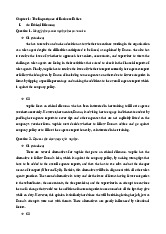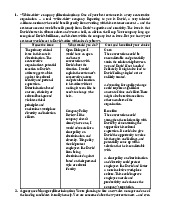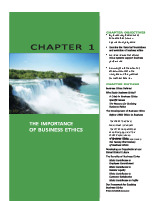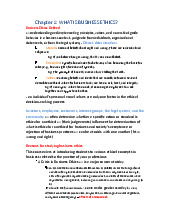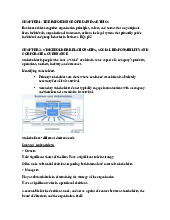








Preview text:
lOMoARcPSD| 38777299
NATIONAL ECONOMICS UNIVERSITY *** BUSINESS ETHICS
Managing the risks of Global Bribery in Business Name: Nguyen Thi Huyen Trang Student ID: 11215843 lOMoAR cPSD| 38777299 Table of Contents
.....................................................................................................................................................1
I. Abstract..................................................................................................................................3
II. Differences in the U.S and U.K...........................................................................................3
1. An overview:...........................................................................................................................3
2.Facilitation Payments:............................................................................................................4
3.Foreign Public Officials.........................................................................................................4
4.Penalties under FCPA and U.K BA........................................................................................4
III. Some examples of penalties under the FCPA and the U.K Bribery Act........................5
1.Siemens and Ralph Lauren:...................................................................................................5
2.Prosecutions under the U.K Bribery Act:...............................................................................6
IV. The impact of bribery:........................................................................................................6
Questions....................................................................................................................................8
Sources.....................................................................................................................................10 lOMoARcPSD| 38777299 I. Abstract
According to Bahoo et al. (2020), the term corruption covers a wide range of illegal
activities, including bribery, fraud, financial crime, abuse, falsification, favoritism,
nepotism, manipulation, and misrepresentation by public and private officials. In this
paper, I concentrate on the specific form of corruption that is bribery due to some reasons.
Bribery is one of the most prevalent kinds of corruption in global business, bribery
which is transnational and corruption are the 2 factors intensifying ethics and
concerns for companies doing business on a global basis. Lots of corporations need to
deal with bribery, even the most well-known organizations, especially multinational
organizations that have to monitor their subsidiaries in various countries.
Bribery is defined as the offering, promising, or giving of something to influence a
public official or individuals to get preferential treatment. The “grease in the wheels”
perspective seeks to explain the “efficient corruption” claim, which refers to the
convenience of getting things done through bribery (Hungtington, 1968; Leff, 1964;
Lui,1985). This economic perspective argues that individuals or organizations take
part in corruption to maximize self-interest ( Misangyi et al., 2008). Accordingly,
individuals are driven by self-interest and may engage in bribery to extract personal benefits.
Bribery varies is also based on the culture of many countries so it’s clear that the
discrepancy between bribes and gifts that an act of hospitality is just a gray line, even
the most well-known anti-bribery laws aren’t clear on this problem. As while bribery
is considered unacceptable in countries such as the U.S or U.K, in many countries it
is an established way of doing business that leads to limited business opportunities in
certain countries. Many companies must deal with the challenge of determining what
constitutes a gift or an act of hospitality and what can be construed as a bribe.
How does bribery affect firm performance in transition economies and what would be
the consequences of global bribery while bribery itself increases firms’ growth.
There are two laws that prohibit companies with transactions in those countries where
this form of misconduct is acceptable from bribing officials anywhere, the U.S
Foreign Corrupt Practices Act and the United Kingdom Bribery Act. Some countries
such as China, Brazil,… are on their way to having their own foreign anti-bribery
laws. Besides this, multinational enterprises need to take action to eliminate this
uncertainty for employees, by implementing a code of conduct with clear
expectations on bribery versus gifts and entertainment, they can set an example that
what can be tolerated and what can not.
Overall, this case compares and shows the background, rules, and regulations of
FCPA and the U.K Bribery Act, moreover, it offers a specific overview of how
bribery affects national institutions, including political, social, and economic institutions. lOMoARcPSD| 38777299
II. Differences in the U.S and U.K 1. An overview:
• Foreign Corrupt Practices Act
The Foreign Corrupt Practices Act of 1977 ( FCPA) was enacted for the purpose of
making it unlawful for certain classes of persons and entities to make payments to
foreign government officials to assist in obtaining or retaining business. Specifically,
the anti-bribery provisions of FCPA prohibit the willful use of any offer, payment,
promise to pay, or authorization to the payment of money or anything of value to any
person, while knowing that all or a portion of such money or thing of value will be
offered, given or promised, directly or indirectly, to a foreign official to influence the
foreign official in his or her official capacity, induce the foreign official to do or omit
to do an act in violation of lawful duty or to secure an improper advantage in order to
assist in obtaining or retaining business.
• United Kingdom Bribery Act:
The United Kingdom Act of 2010 ( UK Bribery Act) is the primary anti-corruption
law in the United King Dom. The Bribery Act includes provisions against all forms
of bribery. The Act states the 2 general offenses include covering the offering,
promising, or giving of a bribe to any government official, or the acceptance and
request for a bribe by any government official. This is a broad prohibition that
appears to encompass bribery in all public and commercial activity, including bribery
involving non-profit or charitable activity if that activity was performed by a body of
persons. Perhaps the only bribery that would not be covered by the Act would be
purely private bribery. For example, a bribe to induce the recipient to publish or
withhold personal information. While many herald the Bribery Act as taking a strong
stance against bribery and corruption, others believe that the law may be too harsh.
Fears of whether items traditionally seen as gifts could now be perceived as bribes
have increased among different companies, prompting many to update their
anticorruption policies and codes of conduct.
2.Facilitation Payments:
This is a significant difference between these 2 laws that can be clearly realized. The
FCPA allows for small payments to expedite routine transactions, known as
facilitation payments, however, while there is no set amount for facilitation payments,
gifts under $100 are generally deemed to be acceptable. These facilitation payments
are meant to speed up routine transactions and convince public officials to perform
their functions. They are in no way intended to convince government officials to
provide preferential treatment to a firm.
Unlike the FCPA, there is no facilitation payment exception in the Act. During a
debate in which a facilitating payment exception was proposed, many commentators
opine that facilitation payments are a slippery slope, even if exempted by the FCPA.
The OECD guidance and the Bribery Act should make companies even warier of this
petty corruption. But, it has to face pressure from 2 kinds of business, mid-size and lOMoARcPSD| 38777299
small-size businesses, the authorities agreed to review and maybe lessen the
restrictions against facilitation payments 3.
Foreign Public Officials
While the FCPA is concerned with bribing foreign or government officials, the
UKBA makes it illegal to pay bribes to private and public officials or enterprises
which means a person who offers a bribe could be liable under the Bribery Act even
if the bribe was not to a foreign official. 4.
Penalties under FCPA and U.K BA FCPA:
The implications and consequences of bribes gradually changed, and the potential
punishment for violating the FCPA varies from case to case. For each anti-bribery
violation, corporations are subject to a fine of up to $2 million while individuals are
subject to a fine of up to $250,000 as well as imprisonment for up to five years.
Business entities can face fines capped at $25 million for each accounting and record-
keeping violation. Individuals are subject to a fine of up to $5 million and
imprisonment of up to 20 years per violation. UKBA:
If found guilty of violating the UKBA, penalties per violation are more
straightforward and stringent than the FCPA. Violating the Bribery Act can carry a
maximum of 10 years in prison, unlimited fines, and the possibility of the confiscation of property.
III. Some examples of penalties under the FCPA and the U.K Bribery Act
Though there are lots of examples given, this paper discussed the most highlighted
examples to give the clearest understanding to readers.
1. Siemens and Ralph Lauren:
Siemens is a German and global multinational company in electronics and electrical
engineering. The reason why this corporation needs to be subject to the FCPA though
it is a foreign firm is that Siemens’s American Depositary Receipts are traded on New York Stock Exchange. Bribes: -
$5 billion in bribes to win a mobile phone contract in Bangladesh -
$40 million in bribes to win a $1 billion contract to produce national identity cards. -
$16 million in Venezuela for urban rail lines -
$12.7 billion in bribes to senior officials in Nigeria for government contracts -
$20 million to senior government officials to build unauthorized power plants. -
$14 million in China for medical equipment lOMoAR cPSD| 38777299
In 2008 Siemens pleaded guilty to violating the law and agreed to pay a fine of more
than $800 million, as well as a fine in Munich, Germany for the board’s failure to
assume its proper supervisory responsibilities.
Siemens is an example of the global reach of the FCPA and at the time it was found
guilty, this was an unprecedented case because of the geographic reach and scale of the bribery.
The response of multinational corporations has significant financial and reputation
repercussions, this can be seen in the case of Ralph Lauren.
In 2010, this company had the effort to improve its worldwide internal controls and
found its Argentine subsidiary paid bribes to government officials to secure the
importation of their product in Argentina. Right after they found that; this corporation
reported to the SEC and proved cooperative with the subsequent bribery probe. In
2013, Ralph Lauren entered a non-prosecution agreement with SEC because of the
company’s prompt response, thoroughness of its investigation, and cooperation with
authorities, Besides that, it paid a lot of money in illicit profits and interests to the SEC.
Ralph Lauren is an example of the benefits of prompt action and cooperation in light of any such discovery.
2. Prosecutions under the U.K Bribery Act:
Having lots of differences significantly from the intent of the FPCA, the U.K Bribery
Act combats bribery in every aspect of life.
The first one who was prosecuted under the Bribery Act was Clerk Munir Yakub, he
was convicted of accepting a bribe in exchange for not inputting details of a traffic
summons into a court database. And he needed to be sentenced to 4 years in prison.
Some of the cases don’t pertain to foreign officials, which differs significantly from
the core laws of the FCPA, such bribery would not be considered a violation of the FCPA.
IV. The impact of bribery:
The influence of institutions and the way they tolerate bribery must be considered.
Corporations operate based on the tone from the top, norms, and rules which consist
of political, social, and economic conventions. Business activities are limited and
controlled by government legislation, of course including bribery. It’s still based on
the government’s attitude in its way to preventing and dealing with bribery when it
occurs. While the U.S and the U.K authorities put these 2 Laws, FCPA and UKBA,
as their top priority and totally obey the rules, there are some countries where it is
usual for individuals, and corporations to pay bribes to perform business functions
(secure contracts, retain benefits, and etc…) Nations with weaker institutions tend to
have more incidences of bribery, corruption happens in the social, political, and
economic sectors. It is said that bribery is more typical in communist countries such lOMoARcPSD| 38777299
as China and it is seen as an acceptable way of doing business. This table provides a
list of the countries most likely to use bribery to conduct business. 1. Russia 2. China 3. Mexico 4. Indonesia 5. United Arab Emirates 6. Argentina 7. Saudi Arabia 8. Turkey 9. India 10.Taiwan
When politicians are corrupt (receive bribes), their citizens will engage in the same
type of this misconduct right away and forget about the rules. The civil unrest that
can result from corruption carries the risk of conflicting extreme violence and harm.
Thus, the political implications of bribery include cognitive distancing and a lack of
trust in the government as well as a culture permeating corruption. Governments with
a high amount of corruption are likely to be run by despots with little incentive to
protect or acknowledge universal human rights.
A country perceived as lacking ethical integrity experiences reduced tourism and less
regard from the rest of the world. There is an obvious relationship between the level
of corruption in a country and its socioeconomic standing.
Beyond those negative effects, bribery also harms businesses and the individuals they
deal with. When companies are disadvantaged by unfair competition from bribery,
wealth distribution becomes more polarized in the marketplace and companies may be forced to fire workers. Questions
1. What are the differences between the provisions of the United States Foreign Corrupt
Practices Act and the United Kingdom Bribery Act? United States Foreign United Kingdom Bribery Act Corrupt Practices Act (FCPA) Application Narrow application than
Representing part of a broader
Bribery Act international trend and has an even wider application than the FCPA.
Facilitation Payments It allows for facilitation
It leaves no room for facilitation
payments, recognizing in payments so it is considered too harsh lOMoAR cPSD| 38777299
some countries that it might be hard for businesses to get routine
transactions done in a timely manner without them. Bribery of foreign It is especially concerned
It makes it illegal to pay bribes to ( public) officials with bribing foreign or
private and public officials or government officials enterprises.
Application in A company only has strict It applies strict liability to any firm liability for
bribery as it commercial firm that does not have related to accounting
“adequate” for preventing bribery provisions for public companies
Active and It only covers active It prohibits both active and passive Passive bribery, that is to
say the bribery i.e., the taking of a bribe giving of a bribe Penalties Or offenses committed
Individuals- up to 10 years under the FCPA an
imprisonment and/ or an unlimited fine individual can be fined up
corporation- unlimited fine, possible to $250,000 per violation
debarment from public tenders. and may also be given
up to 5 years imprisonment. A company guilty of this act is liable for
a fine of $2,000,000 per violation.
2. Check for more recent situations where companies have been accused of violating
the Foreign Corrupt Practices Act. Why do you think these companies chose to engage in bribery?
In 2012 Walmart, Hewlett Packard, IBM, AVON, and many others were under
investigation for violations of the U.S Foreign Corrupt Practices Act. I think
companies chose to attempt bribery in order to gain an advantage over their
competitors. Walmart, they were trying to gain the business of an investment firm
by bribing officials of specific companies. These companies understand that it is
illegal and there are fines or even sentences that can be handed down but they
seem to feel that the positives far outweigh the negatives. I think once you reach
this point where the companies are blatantly ignoring regulations the penalties
need to be more drastic so they understand how serious the situation truly is.
3. Why is it so difficult to determine when a minor gift, entertainment, or incentive constitutes a bribe
A gift is something of value given without the expectation of return; a bribe is the
same thing given in the hope of influence or benefit.
On a very basic level, we give or exchange gifts with individuals or groups of
individuals with whom we want to have some form of social relationship (not
necessarily romantic). People see no harm in gift giving and it is generally viewed
as something positive. It is associated with kindness and selflessness. lOMoARcPSD| 38777299
Gifts and entertainment are familiar in business practices and customer relations
worldwide. But they can raise conflict-of-interest problems and can border on
bribery. Knowing where to draw the line is not easy. One method is to know what
the organization’s policy and procedures are related to receiving a minor gift,
entertainment, or incentive and then making a moral and ethical choice. There's
no such thing as a free lunch," or even a free pencil. Sources https://0-www-sciencedirect-
com.libopac.hust.edu.vn/science/article/pii/S0748575114000062
https://www.thebalancemoney.com/what-is-the-foreign-corrupt-practices-
act5187809 https://www.bartleby.com/essay/The-US-Foreign-Corrupt-Practices- Act-FCPA- PC4WLR6DN3B
https://www.dowjones.com/professional/risk/glossary/anti-bribery-
corruption/ukbribery-act/ https://www.justice.gov/criminal-fraud/foreign- corrupt-practices-act
